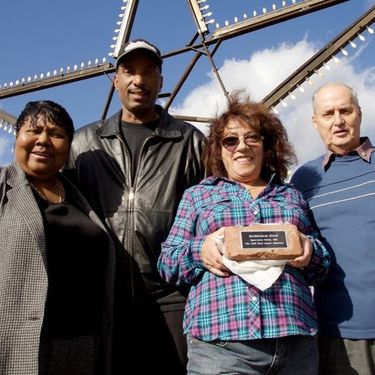
Caecilia Alexandre
She is a member of the Nomomente Institute based in Montreal that provides financial and other resources to indigenous and local communities so they may share their experiences and ideas in international and educational forums.
She is also member of several research centres such as :
- Le Centre interuniversitaire d’études sur les lettres, les arts et les traditions (CELAT), Université Laval;
- Le Centre de droit international et transnational de l’Université Laval (CDIT);
- L'Institut du patrimoine de l’UQAM;
- L'Institut du patrimoine culturel de l'Université Laval.
Sessions auxquelles Caecilia Alexandre participe
Mardi 7 Juin, 2016
Sessions auxquelles Caecilia Alexandre assiste
Vendredi 3 Juin, 2016
Welcome addresses and cocktail, followed by the Concordia Signature Event "The Garden of the Grey Nuns". As the opening ceremony and cocktail take place in the former Grey Nuns' Motherhouse, recycled into campus residence and reading rooms by Concordia University, delegates will also have the possibility to discover the video Three Grey Nuns (3 minutes, by Ron Rudin and Phil Lichti. Three Grey Nuns recount their memories of communal life in the Grey Nun’s Motherhouse. Built...
Samedi 4 Juin, 2016
What if we changed our views on heritage? And if heritage has already changed? While, on the global scene, states maintain their leading role in the mobilization of social and territorial histories, on the local scale, regions, neighbourhoods and parishes have changed. Citizens and communities too: they latch on to heritage to express an unprecedented range of belongings that no law seems to be able to take measures to contain, often to the discontent of...
Heritagization (the various means by which cultural features—either material or immaterial—are turned into a people’s heritage) has recently become, for Amerindian groups, a major means to gain visibility and recognition in the new Latin American social and political landscapes where cultural diversity is endowed with an increasingly critical role. Different forms of cultural heritagization have largely been studied elsewhere, particularly in North America. However, they are far less known in...
With sustainable development gaining momentum as a priority of UNESCO heritage policies, an increasing number of food-related nominations are being submitted for inscription on the lists of the Convention for the safeguarding of the intangible cultural heritage. The Mediterranean diet, traditional Mexican cuisine and the Japanese dietary culture of washoku are just some examples of this booming phenomenon. Since food and foodways are powerful references for self-representation and ident...
Dimanche 5 Juin, 2016
With sustainable development gaining momentum as a priority of UNESCO heritage policies, an increasing number of food-related nominations are being submitted for inscription on the lists of the Convention for the safeguarding of the intangible cultural heritage. The Mediterranean diet, traditional Mexican cuisine and the Japanese dietary culture of washoku are just some examples of this booming phenomenon. Since food and foodways are powerful references for self-representation and ident...
Heritagization (the various means by which cultural features—either material or immaterial—are turned into a people’s heritage) has recently become, for Amerindian groups, a major means to gain visibility and recognition in the new Latin American social and political landscapes where cultural diversity is endowed with an increasingly critical role. Different forms of cultural heritagization have largely been studied elsewhere, particularly in North America. However, they are far less known in...
"What does heritage change?" is a multifaceted question to which the answer(s) are in primary respects related to real-life negotiations among different groups of citizens, cultures, races, ethnic groups, sexual identities, and social classes about received, official and/or widely accepted or accomodated intangible attributes, cultural traditions, historic monuments, buildings, and other transmitted or revived historical legacies. Heritage designated by and for whom, for what motivations, an...
Directed by Tom Fassaert and presented by Marc Jacobs. ___ Doel, a Belgian village near the Dutch border, is disappearing quickly and deliberately. Not because of the four old nuclear reactors on its territory, but because the Flemish government decided that the village might block projects for new docks for the Antwerp harbour, plans developed since the 1960s. In the 21st century this process of officially encouraged depopulation is coming to an end: 2500 inhabitants i...
Lundi 6 Juin, 2016
Questions about the repatriation of cultural property, issues of access and exclusion in the World Heritage system, intangible heritage practices in conflict with human rights norms, or the ways in which the international human rights regime is interpreted as a form of cultural heritage itself: rights are now considered relevant in a broad variety of heritage situations. This is reflected in the incorporation of references to human rights in a series of key international heritage-relate...
L’objectif de cette table ronde est de questionner une éventuelle ratification par le Canada de cet instrument multilatéral. La réunion se tiendra en français et en anglais avec interprétation simultanée. Elle prendra la forme d’exposés d’experts et de tables de discussion. Une consultation sera préalablement menée auprès des principaux groupes de praticiens du pays afin de recueillir leur avis sur la question de la ratification et de nourrir les échanges de la réunion. Dif...
Le patrimoine fait aujourd’hui l’objet d’attentions autant que d’agressions et de destructions. Cela peut s’expliquer par les difficultés de son identification ou de sa conservation. Cela peut plus profondément s’expliquer parce que, dès le départ, il célébre un événement ou conserve une mémoire qui peut être ou devenir une source de dissenssions et de conflits politiques. Enfin, sa reconnaissance suscite des gains économiques pour les uns mais des pertes pour les autres. Mais peut-être...
To celebrate our film series dedicated to heritage, sponsored by the Department of American Studies at the University of Maryland and the United States Chapter of the Association of Critical Heritage Studies, this event will spotlight the iconic Sugar Shack, which is rooted from Quebec to New-England and which is both the place of maple syrup production and of friendly gatherings during the maple syrup season. In a festive atmosphere, delegates will be invited to taste one of the essential of...
Directed by William Shewbridge and Michelle Stefano USA; 35 mins Presented by Michelle Stefano ___ After 125 years of operation, the Sparrows Point Steel Mill (Baltimore, Maryland) finally closed its doors in 2012. The film, “Mill Stories”, examines the importance of the mill from the perspectives of former workers and community members while connecting their story to the larger narrative of industrial boom and bust. The film seeks to amplify the voices of forme...
Directed by Christine Walley and Chris Boebel Presented by Michelle Stefano When the steel mills began closing on Chicago's Southeast Side, residents could feel the American Dream slipping away. Decades later, the loss of the steel industry has left permanent scars. The documentary film, Exit Zero: An Industrial Family Story, is named for the highway exit number for Chicago’s old steel mill neighbourhoods and captures the feeling of a region passed over. In poignant and some...
Mardi 7 Juin, 2016
Le concept de patrimoine culturel immatériel (PCI) a fait l’objet de nombreux colloques et publications depuis la promulgation de la Convention pour la sauvegarde du patrimoine culturel immatériel de l’UNESCO en 2003, voire même avant. Toutefois, peu d’entre eux se sont attardés à la question de l’impact réel des systèmes et politiques mis en place pour favoriser le développement des pratiques culturelles transmises de génération en génération comme les arts et l’artisanat traditionnels, les ...











